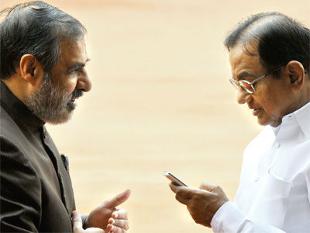Finance ministry takes exception to commerce ministry OKing trade pacts; to take over negotiation of all investment pacts

Economic Times | 2 Dec, 2013
Finance ministry takes exception to commerce ministry OKing trade pacts; to take over negotiation of all investment pacts
By Deepshikha Sikarwar, ET Bureau
NEW DELHI — The finance ministry will take over the negotiation of all future investment pacts, including those part of comprehensive trade deals, it has told the commerce department, having taken strong exception to the latter unilaterally finalising the text for the India-Asean Comprehensive Economic Partnership Agreement, said two government officials aware of the development.
"The finance ministry has written saying henceforth all investment agreements will be negotiated by it," said a government source.
Finance Minister P Chidambaram had raised concerns at Thursday’s Cabinet meeting over the pact’s text, which had been decided without consulting his ministry, after which the proposal was deferred.
The finance ministry, which is the administrative department for India’s investment policy, was neither consulted by the commerce department during the talks nor were its views sought when the draft text of the pact was finalised.
North Block has the administrative mandate to negotiate bilateral investment promotion agreements or BIPAs. The commerce department has been negotiating free and regional trade agreements as also comprehensive economic partnership pacts that have services and investment components. The usual practice has been to consult the finance ministry on all components as these pacts have implications for the economy, investments and the government’s finances.
The proposed pact was to be signed on Friday on the sidelines of the WTO ministerial meeting in Bali.
The commerce department hadn’t even sent the note to the finance ministry before putting it before the Cabinet, said another government official. Any proposal that is to be taken up by the Cabinet is circulated well in advance to the ministries and departments concerned, first in the form of a draft note and then a final note. The PMO forwarded the Cabinet note barely days ahead of the meeting as the key stakeholder ministries’ comments were not seen appended to the note.
The finance ministry has highlighted that the wording for the accord with Asean was not in sync with the latest model for such pacts prepared after much deliberation to protect the country from arbitration suits. India reworked the text for BIPAs after it was served as many as 17 arbitration notices.
The new text has built-in safeguards that address vulnerabilities in the existing draft. The finance ministry wants all investment agreements to reflect the changes in the template carried out after a review by a committee of secretaries. India is also proposing to renegotiate all 82 BIPAs it has entered into so far.
The reworked BIPA text stipulates that a foreign investor will not be able to challenge the government on the legality of an unfavourable verdict by the Supreme Court. It would have to exhaust remedies under local laws before taking up an issue for international arbitration under the BIPA India has with its home country.
The model BIPA text also provides that the foreign investor will have to abide by provisions relating to legal remedies in the contract it has entered into with the local partner or the government.
India faces BIPA arbitration suits filed by "foreign investors such as Sistema Joint Stock Financial Corporation, Vodafone International Holdings BV, Devas Employee Mauritius Pvt Limited, Children’s investment Fund Management (UK) LLP, etc", the commerce minister said in Parliament last year. The grounds for these range from the Supreme Court cancelling telecom spectrum allocations to retrospective tax levies and diktats to state-owned companies in which overseas investors have financial stakes.
Worried at the performance of the manufacturing sector and growing imports putting pressure on the current account deficit, the finance ministry is also of the view that most trade pacts benefited imports more than helping exports. The issue had figured at a recent meeting of the Trade and Economic Advisory Council chaired by Prime Minister Manmohan Singh. North Block has been pushing for a review of the country’s free trade agreement strategy.
India signed an FTA for goods with the 10-nation Asean in 2009. New Delhi has been keen on a services deal, an area where it feels India has an advantage. India’s exports to Asean declined by 10.2% in 2012-13 to $32 billion, whereas imports grew 2.86% to $43.7 billion, leaving a trade gap of about $11 billion. Lower tariffs in Asean countries offer local manufacturers a significant advantage over Indian producers.





